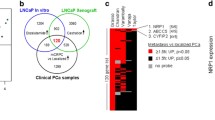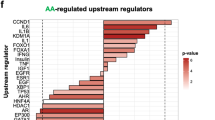Abstract
Thalidomide has been shown to have species- and metabolic-dependent antiangiogenic activity in vitro and in vivo, suggesting its potential in treating human angiogenesis-dependent pathologies such as solid tumors. Based on promising preclinical studies, thalidomide has entered phase II clinical trials for prostate, brain, breast cancer, and Kaposi's sarcoma. However, the antiangiogenic mechanism of action is largely unresolved, as are its effects on tumor-associated gene expression, cytokine secretion, etc. We have investigated the effects of thalidomide on: 1) the secretion of prostate-specific antigen (PSA) in a human androgen-dependent prostate cell line; 2) growth and viability of human prostate cells; and 3) differential gene expression profiles of thalidomide-treated vs untreated human prostate cells. A human androgen-dependent prostate carcinoma cell line (LNCaP) and a human androgen-independent prostate carcinoma cell line (PC-3) were incubated with thalidomide 0.6, 6, or 60 μg/mL for 5–6 days. Secreted PSA from LNCaP cells was measured using a commercial enzyme-linked immunosorbant assay. Cell viability studies were conducted in both LNCaP and PC-3 cells using the same thalidomide concentrations. Furthermore, the differential gene expression of thalidomide-treated LNCaP cells was compared to that of untreated control cells using a commercially available human cancer cDNA expression array system. Thalidomide-treated LNCaP cells demonstrated increased PSA/cell levels at all concentrations tested compared to untreated control cells. Thalidomide demonstrated a cytostatic effect in LNCaP cells but had no appreciable effect on PC-3 cell viability compared to untreated control cells. Comparison of cDNA expression arrays hybridized with thalidomide-treated LNCaP cDNA probes suggests that thalidomide may up- or downregulate expression of angiogenesis-related genes, i.e., vitronectin, but these differential effects require further verification. Thalidomide over a range of doses has demonstrated nontoxic, cytostatic activity in LNCaP cells and significant upregulation of LNCaP cell PSA secretion in vitro. Furthermore, preliminary data from cDNA nucleic acid arrays of thalidomide-treated LNCaP cells suggest that thalidomide upregulates a potential angiogenic modulatory protein, the vitronectin precursor, which may eventually link thalidomide's antiangiogenic activity with modulation of angiogenic vascular integrin pathways.
Similar content being viewed by others
Author information
Authors and Affiliations
Rights and permissions
About this article
Cite this article
Dixon, S., Kruger, E., Bauer, K. et al. Thalidomide up-regulates prostate-specific antigen secretion from LNCaP cells. Cancer Chemother Pharmacol 43 (Suppl 1), S78–S84 (1999). https://doi.org/10.1007/s002800051103
Issue Date:
DOI: https://doi.org/10.1007/s002800051103




